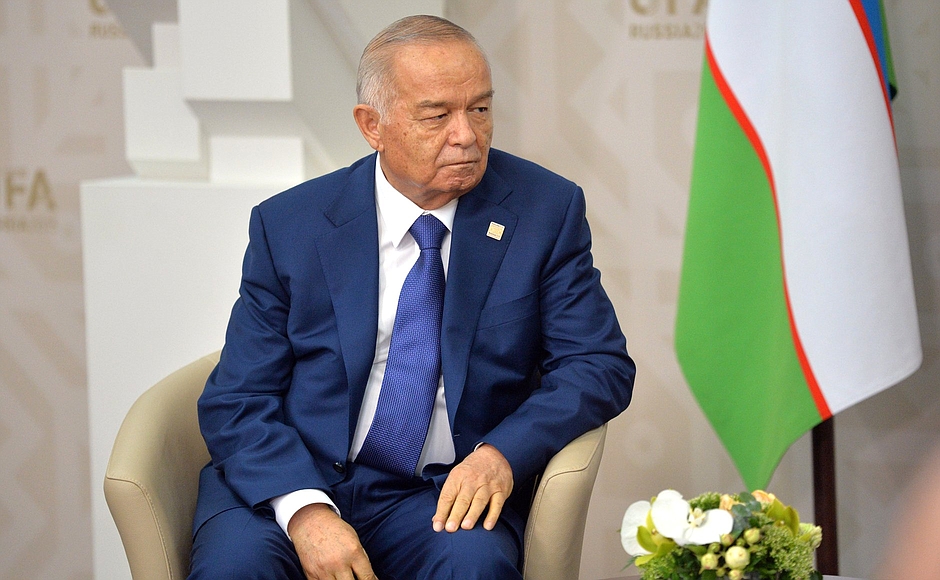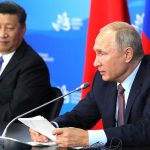by Joanna Lillis
Following days of uncertainty surrounding the fate of the septuagenarian strongman who ruled Uzbekistan for more than a quarter of a century, the suspense is over: Islam Karimov is dead. Uzbekistan’s government confirmed his death on September 2 after he suffered a stroke in late August.
News of the demise of the 78-year-old president — albeit far from unexpected — sends Uzbekistan into uncharted territory, with rival power groups apparently jostling over the succession. But one thing is clear: for Uzbekistan, the Karimov era is over.
Karimov was born in Samarkand in 1938, at the height of the Stalinist terror, but his childhood is shrouded in mystery. Most reports suggest he grew up in a Soviet orphanage. According to some accounts, it was because he was an illegitimate child of a woman whose husband was in jail, and who placed the child in an institution when the man was released.
The career path that ultimately propelled Islam Karimov to the presidency followed a trajectory typical for an ambitious young Soviet of the era.
After graduating from a Tashkent polytechnic with a degree in engineering, he started his working life in 1960 in a lowly position at Tashselmash, an agricultural plant, then became an engineer at Tashkent’s Chkalov aviation factory. Later, he joined Gosplan, the institution in charge of central planning for the economy of the Soviet Union — a career move that clearly made its mark, since much of Uzbekistan’s economy to this day is still run in a Soviet-style command system.
His subsequent rise within the party apparat was facilitated by two very powerful political patrons — Sharaf Rashidov, who had served as Uzbekistan’s Communist Party boss since 1959, and Ismail Jurabekov, who was the political godfather of the Samarkand political clan.
Karimov worked his way up to become deputy head of Gosplan in Uzbekistan, then in 1983 took another career leap, this time into the republic’s cabinet of ministers, as finance minister. By that time, he also had a degree in economics.
A corruption scandal that erupted in 1983 played an important role in positioning Karimov for paramount leadership. The scandal prompted Rashidov to commit suicide (according to official accounts) and prompted officials in Moscow to conduct a purge of the Uzbek republic’s hierarchy. Karimov survived that personnel cleansing and in 1986 was promoted to deputy premier of Soviet Uzbekistan, a role he combined with heading Gosplan.
Karimov’s political rise was cemented in 1989, just six years after he had joined the government, when Soviet leader Mikhail Gorbachev appointed him first secretary of Uzbekistan’s Communist Party, making him the leader of Soviet Uzbekistan.
Karimov neither expected nor welcomed the collapse of the Soviet Union two years later. In a demonstration of his political flat-footedness, he tacitly gave his backing to the failed hardliner coup of August 1991 — a choice pointedly written out of Uzbekistan’s history books.
That coup led to Karimov taking over a country ill-prepared for independence and gripped by turmoil in the potentially explosive Fergana Valley, where radical Islamists had begun to sense an opportunity to pursue their cause. The president traveled in person to the city of Namangan to confront two emerging Islamists — Tahir Yuldashev and Juma Namangani — and had to endure a public dressing down at their hands before a crowd of supporters. Karimov never forgot the humiliation, and his revenge against the Islamists was merciless and unceasing.
Karimov remained at the helm of sovereign Uzbekistan for the next quarter of a century, entrenching himself in power through the wily exploitation of rival patronage networks, the rigging of elections, the running of a massive state propaganda machine, and the ruthless suppression of dissent.
Under Karimov’s rule, Uzbekistan never staged an election deemed free and fair by credible international observers, and Karimov only once ran in a poll facing any genuine opposition.
In 1991, he was challenged by Muhammad Solih, a poet-turned-politician whom Karimov trounced, and later had arrested. Solih subsequently fled into exile.
In three elections held over the quarter of a century since, Karimov beat stalking horses with over 90 percent of the vote (most recently last year). He has also extended his rule via referendums and constitutional tinkering.
Karimov liked to talk up his legacy as one of democracy, stability and prosperity, based on his “Uzbek model” of development. Loosely translated, that meant striving for self-sufficiency and promoting “Uzbek values” — a policy which bred bizarre edicts discouraging “western imports” from Valentine’s Day to Santa Claus and rap music.
His isolationism extended to foreign policy: Karimov was courted by the big powers for geopolitical leverage and gas supplies, but he kept all at arms’ length, suspicious of Russia’s post-colonial aims and the US-led democratization agenda.
Karimov may have talked up his legacy, but in reality he bequeaths his successor an autocratic state in an economic mess, complete with a thriving currency black market and an impoverished population dependent on dwindling labor migrant remittances from recession-hit Russia.
Karimov will likely be best remembered for two things: a massacre of demonstrators in the city of Andijan in 2005 that he blamed on an Islamic uprising (many witnesses and human rights advocates disagreed); and a Shakespearean family feud centered around his eldest daughter, Gulnara.
Politician, businesswoman, pop diva and fashion designer, she was once a mover and shaker in Tashkent, memorably described in a WikiLeaks cable as a “robber baron” (for her habit of greedily grabbing assets) and “the single most hated person in the country”. Gulnara was tipped to succeed her father, but in 2014, targeted by international bribery and money-laundering probes, she was placed under house arrest in Tashkent, where she is believed to remain.
Many in Uzbekistan have contrasted Karimov’s long indulgence of his daughter with his merciless attitude to others who step out of line.
According to Human Rights Watch, Uzbekistan holds some 10,000 perceived regime opponents — political and religious dissidents, journalists, witnesses to the Andijan shootings — in jails where torture is rife. In one notorious case, two prisoners were boiled alive; in another, opposition activist Sanjar Umarov was choked until his vocal chords were permanently damaged.
Another contentious human rights issue has been the use of slave labor in Uzbekistan’s cotton fields.
Karimov batted off criticism of his atrocious human rights record with talk of the need to defend Uzbekistan against religious extremism (bombings in Tashkent in 1999, which conspiracy theorists muttered were staged, sparked one crackdown, the Andijan protest another).
Islamic extremism was certainly a threat in Uzbekistan in the 1990s, particularly in the Fergana Valley, but critics say Karimov’s repression of pious Muslims did more to fuel radicalism than contain it.
Preparations were reportedly underway to bury Karimov with pomp and ceremony in his birth city of Samarkand on September 3.
Joanna Lillis is a freelance writer who specializes in Central Asia. Reprinted, with permission, from EurasiaNet.





